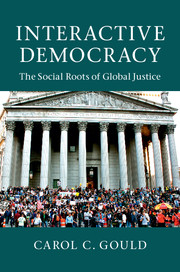Book contents
- Frontmatter
- Dedication
- Contents
- Acknowledgements
- Introduction
- Part I A theoretical framework
- Part II The social roots of global justice
- Part III Interactive democracy – transnational, regional, global
- 11 Diversity, democracy, and dialogue in a human rights framework
- 12 What is emancipatory networking?
- 13 Structuring transnational democracy: participation, self-determination, and new forms of representation
- 14 Democratic management and international labor rights
- 15 Regional vs. global democracy: possibilities and limitations
- Works cited
- Index
- References
14 - Democratic management and international labor rights
Published online by Cambridge University Press: 05 September 2014
- Frontmatter
- Dedication
- Contents
- Acknowledgements
- Introduction
- Part I A theoretical framework
- Part II The social roots of global justice
- Part III Interactive democracy – transnational, regional, global
- 11 Diversity, democracy, and dialogue in a human rights framework
- 12 What is emancipatory networking?
- 13 Structuring transnational democracy: participation, self-determination, and new forms of representation
- 14 Democratic management and international labor rights
- 15 Regional vs. global democracy: possibilities and limitations
- Works cited
- Index
- References
Summary
Introduction
Across 100 countries of the world, cooperatives have over 800 million members, a fact that led the UN to declare 2012 the International Year of Cooperatives. Indeed, a 2008 report by the International Co-operative Alliance based in Geneva states that the top 300 cooperatives generated as much as the tenth largest economy in the world, with revenues of $1.1 trillion.
Concerning a broad range of forms of worker participation in the United States, Gar Alperovitz has noted that despite growing inequality in income and wealth, an increasing number of Americans are involved in co-ops, worker-owned companies, and other alternative forms of economic organization. Alperovitz writes, “Some 130 million Americans, for example, now participate in the ownership of co-op businesses and credit unions. More than 13 million Americans have become worker-owners of more than 11,000 employee-owned companies, six million more than belong to private-sector unions.” He goes on to say: “If such cooperative efforts continue to increase in number, scale and sophistication, they may suggest the outlines, however tentative, of something very different from both traditional, corporate-dominated capitalism and traditional socialism.” The picture that Alperovitz paints here may be a bit rosy, even in regard to worker ownership, and it does not yet centrally address the more challenging aspiration for full-scale worker democracy or worker control.
- Type
- Chapter
- Information
- Interactive DemocracyThe Social Roots of Global Justice, pp. 242 - 255Publisher: Cambridge University PressPrint publication year: 2014



